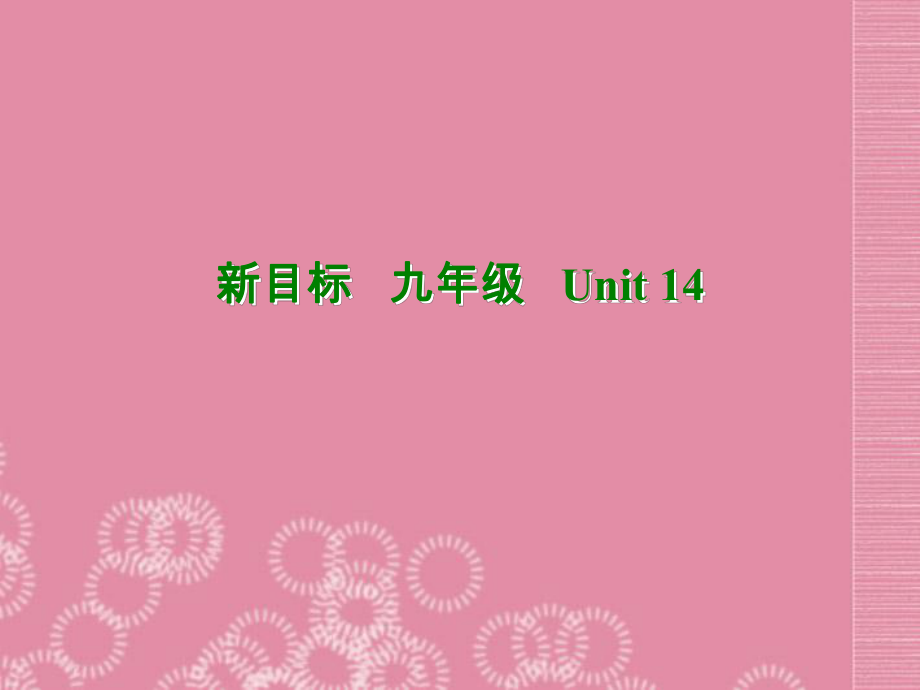《九年級(jí)英語(yǔ)全冊(cè)Unit 14Have you packed yetSelf check課件 人教新目標(biāo)版》由會(huì)員分享�����,可在線閱讀��,更多相關(guān)《九年級(jí)英語(yǔ)全冊(cè)Unit 14Have you packed yetSelf check課件 人教新目標(biāo)版(32頁(yè)珍藏版)》請(qǐng)?jiān)谘b配圖網(wǎng)上搜索���。
1����、新目標(biāo)新目標(biāo) 九年級(jí)九年級(jí) Unit 14Unit 14 Have you packed it yet? Self checkWho is he?Why did he come to visit Xian?Because Xian is his hometown, the place where his ancestors lived.Where does he live?Lian Zhan Taiwan go back to the place where your ancestors lived, worked, studied and playedNingbo is the place
2、where Stephen Chous ancestors livedDo you know where your own ancestors come from?Family rootsa overseas ChineseShe has come to look for her families roots.Discuss these questions:1. Do you, or someone you know, have family members who lived outside China?2. Have you ever talked about your ancestors
3�����、 with your family?3. Do you think “ancestors” are important?Reading TaskHes already visited the place where his ancestors lived.根據(jù)課本第根據(jù)課本第116-117頁(yè)的短文完成下列頁(yè)的短文完成下列表格�����,每空詞數(shù)不限�。表格,每空詞數(shù)不限��。In Search ofRoots summercamp programTime to start 1980Organizer(1)_ _ ofGuangdong ProvinceTime thesummercamp lasts(2)_
4����、The local governmentTwo weeksIn Search of roots summercamp programPurpose ofthe programTo give youngoverseas Chinesethe chance to learn more aboutthemselvesOverseas ChinesestudentsAgesBetween (3)_years oldActivities They study (4) _ , see the big changes and visit interesting sights, but the most ex
5��、citing part of the trip is (5)_ . going to their ancestors village 16 and 25Chinese culture1. What is it? It is the name of a summer camp program to help young overseas Chinese to look for their family roots.2. Who organized it? It is organized by the local government of Guangdong Province.3. When d
6��、id the program start? It started in 1980.4. How successful is the program? It has brought thousands of overseas Chinese students to China, their homeland.5. What are the camp members like? They are usually between 16 and 25 years old, can hardly speak Chinese and have never been to China before. 6.
7���、Where are they from?Canada AmericaRobert QianCathy Qin7. What do they do during their stay in China?.study Chinese culture see the changes visit interesting sights watch the villagers do their daily activitiesgo to their ancestors villagesdrink village welltake walks8. Whats the purpose of the progr
8�����、am?The purpose of the program is to give young overseas Chinese the chance to learn more about themselves. 9. Have they realized their purpose? Yes. 1) Theyve enjoyed the trip. 2) Theyve begun to understand their Chinese roots and who they are.3) Theyve known more about their ancestors and homeland.
9�����、4) Its an important step for them. They are looking forward to finding out more about their roots. Imagine you are Robert. After returning from China, you write a letter to your good friend about the “In search of Roots”.Dear , I have just returned from a two-week trip to Guangdong Province in South
10����、ern China. In the past fourteen days,I have been to my ancestors village. There, we studied Chinese culture, saw changes that had happened in that area, and visited the interesting things. Thanks to this trip, I am beginning to understand my Chinese roots, Now I am proud of being a Chinese boy. Robe
11、rt.Fill in blanks.1. You can not see the _(根根)of a tree.2. Do you think money is the _(根根源)源)of all evil?3. HuangDi is one of our _(祖先祖先).4. Going to college is an important _ in his life(轉(zhuǎn)折點(diǎn))(轉(zhuǎn)折點(diǎn)).5. The visitors are _(主要地)(主要地)Americans.root source ancestors turning point mostly 6. I _(深深地感動(dòng))(深深地感
12����、動(dòng))by what he said.7. The policemen _(搜尋)(搜尋)the murderer now.8. The expert are trying to_(使變使變清清) the water in this river.9. After dinner, you must _(收拾收拾, 清清理理)the table.10. Sima Qian is a famous _(歷歷史學(xué)家史學(xué)家).was deeply moved are searching for clarify clear historian Put the following sentences into
13、 English.1. 今年我去過(guò)那里兩次��。今年我去過(guò)那里兩次�����。I have been there twice this year.2. 到現(xiàn)在我只學(xué)了一千英語(yǔ)單詞�����。到現(xiàn)在我只學(xué)了一千英語(yǔ)單詞���。Up till now I have only learned a thousand English words.3. 這學(xué)期他不太用功���。這學(xué)期他不太用功���。He hasnt worked very hard this term.4. 今天我什么東西都還沒(méi)吃。今天我什么東西都還沒(méi)吃��。I havent eaten anything today.5. 你看過(guò)這樣的電影了嗎你看過(guò)這樣的電影了嗎? Have yo
14��、u ever seen any film like this?6. 這是我看過(guò)的最有意思的書�����。這是我看過(guò)的最有意思的書�。This is the most interesting book I have ever read. 2005 2005年暑假期間我到一家飯店打年暑假期間我到一家飯店打工工, ,給飯店刷盤子給飯店刷盤子, ,打掃衛(wèi)生。每天工打掃衛(wèi)生�。每天工作作7 7個(gè)小時(shí)個(gè)小時(shí), ,為期為期4 4周周, ,賺了賺了200200元錢。這元錢��。這項(xiàng)工作辛苦而枯燥項(xiàng)工作辛苦而枯燥, ,我感到很疲勞我感到很疲勞, ,但但從中體驗(yàn)到了生活之不易�����。從中體驗(yàn)到了生活之不易�����。Homework 每想到新學(xué)期我將能用自己賺的錢買每想到新學(xué)期我將能用自己賺的錢買書書, ,便感到非常的驕傲與自豪便感到非常的驕傲與自豪要求要求: : 1. 1. 語(yǔ)言通順語(yǔ)言通順, ,流暢流暢, ,語(yǔ)法正確語(yǔ)法正確; ; 2. 2. 適當(dāng)發(fā)揮適當(dāng)發(fā)揮, ,談?wù)勛约旱母邢胝務(wù)勛约旱母邢? ; 3. 3. 詞數(shù)為詞數(shù)為8080詞左右詞左右���。Thank you for listening�����!
 九年級(jí)英語(yǔ)全冊(cè)Unit 14Have you packed yetSelf check課件 人教新目標(biāo)版
九年級(jí)英語(yǔ)全冊(cè)Unit 14Have you packed yetSelf check課件 人教新目標(biāo)版

